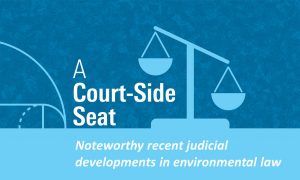As the end of summer approaches, the courts have provided a potpourri of relevant environmental decisions.
FEDERAL COURTS OF APPEAL
Town of Weymouth, et al. v. Massachusetts Department of Environmental Protection (MDEP)
On August 31, 2020, the U.S. Court of Appeals for the First Circuit issued an opinion revising the mandate of its earlier June 3, 2020, ruling in the case. In the earlier ruling, the court vacated the grant by the MDEP of an air permit to Algonquin Gas Transmission to build and operate an air compressor station, ordering the agency to “redo” its Best Available Control Technology analysis within 75 days. Algonquin asked the court to reverse without vacatur because the agency could not comply within the time limits established by the court. The First Circuit agreed, and established a new deadline for the agency of January 19, 2021.






